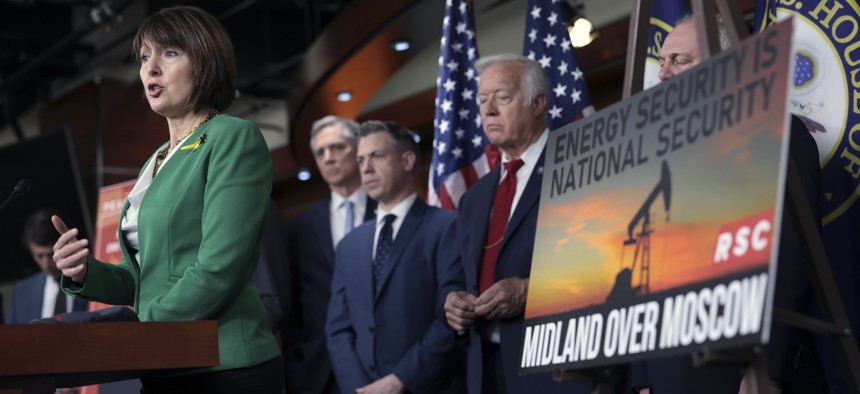War in Ukraine, Soaring Gas Prices Shatter Consensus on Electric Vehicle Rollout

U.S. Rep. Cathy McMorris Rodgers (R-WA) speaks at a House Republican news conference on energy policy at the U.S. Capitol on March 08, 2022 in Washington, D.C. Getty Images/ Kevin Dietsch

Connecting state and local government leaders
Republicans are raising concerns about energy security and reliance on Russia and China, as Democrats say the nation needs to press ahead transitioning away from gas-powered vehicles.
In the early days of the Biden administration, there seemed to be bipartisan cooperation for finding ways to replace pollution-spewing gas-powered vehicles with cleaner electric-powered cars and trucks.
A bipartisan group of senators included $7.5 billion in an infrastructure package that passed last year to help build out electric charging stations across the country. Meanwhile, Republican- and Democratic-led states competed head-to-head for massive electric vehicle and battery factories that would produce the fleets of cleaner cars.
At least on Capitol Hill, those days of bipartisan goodwill on electric vehicles now seem to be fading into the rearview mirror.
Republicans in the U.S. House made the break clear during a hearing on electric vehicles Tuesday.
Instead of talking about the logistics of building out a new network of chargers, many GOP members of the House Energy and Commerce Committee questioned the wisdom of transitioning to electric vehicles at all.
The Republicans said the fallout from Russia’s invasion of Ukraine showed the shortcomings of relying on renewable energy. Many European countries, particularly Germany, tried to phase out nuclear and coal power plants, they argued, but that left those countries overly reliant on Russia for natural gas imports. Now, the European countries cannot wean themselves from Russian energy, hobbling their ability to impose economic sanctions for Russian President Vladimir Putin’s aggression.
“Europe’s dependence on Russian oil and gas is a cautionary tale,” said U.S. Rep. Cathy McMorris Rodgers from Washington state, the top Republican on the committee.
“Instead of focusing on how American energy can be used to counter authoritarian countries, Democrats are doubling down on their work to shut down American energy. These are the same policies that weakened Europe, raised energy prices to historic highs and emboldened Putin to exploit their dependence on Russian energy,” she said.
U.S. Rep. Jeff Duncan, a South Carolina Republican, said Democrats were making problems worse. “We are blessed with energy resources here in America, but we seem to be cursed with liberal politicians who don't understand the simple fact: energy security is national security,” he said.
The criticism, of course, did not go over well with the Democrats on the panel.
“I totally support independence from Russian oil, and I think the world should get independent from Russian oil,” said U.S. Rep. Diana DeGette, a Colorado Democrat. “But I don’t think that that should be an excuse for us to give up our long-term energy plans, which includes moving towards electric vehicles. I’m always shocked at how Congress seems to lurch from crisis to crisis without a long-term energy plan.”
But many Republicans also said shifting to electric vehicles would make the United States vulnerable to threats from China.
“We hear some of our Democratic colleagues and the hopelessly naive [people] at the White House call for a shift to an electrified, green, renewable economy to take on Putin as a solution to reducing our dependence on Russian oil. How absurd,” said U.S. Rep. Bill Johnson, an Ohio Republican.
“Here’s the problem: The United States is currently dangerously dependent on Communist China for batteries, magnets and the sourcing and processing of critical minerals and rare earths – all of which are essential for electric vehicles, charging stations and other electrified energy infrastructure,” he said.
“So just to get this straight: the White House plan is to reduce our dependence on Russian oil and gas by increasing our dependence on Xi Jinping and the Communist Chinese party? Give me a break,” Johnson added.\
U.S. Rep. Kurt Schrader, of Oregon, called the Republican criticisms “complete misinformation.”
“The idea that the energy crisis that we’re facing from the turmoil and tragedy in Ukraine can be answered by turning the spigot and drilling a few more wells is just completely erroneous,” he said. Schrader said the United States could continue to produce more oil and gas resources while moving to an electric future.
“I do not agree that America cannot walk and chew bubble gum at the same time,” he said.
Bob Holycross, the vice president of sustainability, environment and safety engineering at Ford Motor Company, largely stayed out of the partisan fray. But he encouraged Congress to continue its support for electric vehicle infrastructure.
“The United States is at an inflection point where we can see the environmental need and customer demand for innovative high performance electric vehicles. But if we are to be world leaders in this space, we must pivot quickly,” he said. “To be clear: if U.S. policies are not efficient and effective in this transition, we risk being outpaced by global competitors like China and Europe.”
Daniel C. Vock is a senior reporter at Route Fifty and is based in Washington, D.C.

NEXT STORY: Cloud performance: How to measure the things that matter





